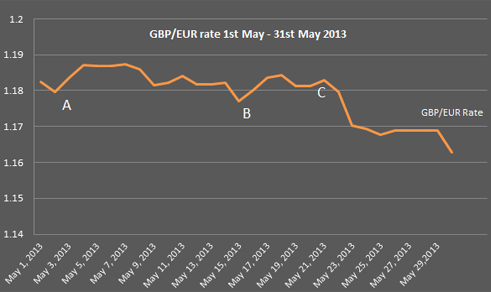Sterling/Euro Currency Review May 2013
Thursday 06 June 2013
Sterling traded within a tight range against the euro throughout most of May, before giving back gains seen in April, reaching a low of €1.1629* at the end of the month.
This outcome followed speculation that incoming Bank of England Governor, Mark Carney, will actively pursue a weak Sterling policy.
During the month Sterling touched a high of €1.1879 against the euro in early May, and traded at a respectable average of €1.1792 throughout the month.
However, Sterling's failure to build any significant and sustainable momentum against the troubled euro, immediately after Point A on the graph, when the European Central Bank (ECB) raised the prospect of negative interest rates on deposits should be of most concern for euro buyers.

Sterling’s lack of strength between Points A& B is extremely difficult to rationalise given the contrasting economic data between the UK and Eurozone.
A plethora of positive economic data in the UK added to growing hopes of a sustainable economic recovery as greatly improved manufacturing and construction data was announced early in May, while the UK service sector reached its highest level for 8 months.
Meanwhile, fears of an intensified recession in the Eurozone grew as an interest rate cut by ECB, from 0.75% to 0.5%, despite being received positively by the markets, looks like a final effort to make good on its pledge to do 'whatever it takes' to promote stability in the Eurozone.
The key contributor to euro weakness early in May was undoubtedly talks of ‘negative deposit rates’ from the ECB. Negative deposit rates would result in banks being charged to deposit funds with the ECB - a policy rejected by Germany.
In theory, such policy makes lending more attractive to banks thus stimulating economic growth; however, a cut in the deposit rate would make holding euros unattractive and could lead to sustained selling pressure on the euro.
The increase in the GBP/EUR rate, illustrated by Point B, came as the Bank of England increased growth predictions for Q2 2013 to 0.5%. If accurate, when allowing for the anomaly caused by the Olympics, 0.5% growth would represent the best quarter of growth since Q3 2011.
Sterling gains, though, were quickly tempered by Bank of England Governor, Mervyn King, who claimed improvements in the UK economy would be "modest and sustained". Nevertheless, after talk of a triple-dip recession at the start of the year a modest and sustained recovery is certainly an improvement to previous forecasts.
Despite the announcement that the Eurozone had entered its sixth consecutive quarter of contraction, Sterling came under considerable pressure from Point C as the International Monetary Fund (despite softening recent criticism of Chancellor George Osborne's economic strategy), admitted that the UK is "still a long way from a strong and sustainable recovery"- a chide largely supported by far worse than expected UK retail sale figures released at the same time.
Outlook
Numerous factors will determine the direction of GBP/EUR rates in the short to medium term with the outlook for the UK economy seemingly improved comparable to recent months.
Concerns remain for Sterling, and although a significant drop in inflation from 2.8% in March to 2.4% in April could undoubtedly be seen as a positive for the UK public in general as costs of living drops, it does open the door for further quantitative easing in the UK - a policy incoming Bank of England Governor Mark Carney is anticipated to exploit. The concern is that when such a policy has previously been applied it has always seen Sterling lose significant value.
Further, one potential point of economic concern for the UK presented in early May when it was announced that Prime Minister David Cameron had been barred from visiting China for having hosted the Dalai Lama’s UK visit last year. With Chinese investment worth approximately £8bn to the UK economy last year alone, this could have a detrimental effect on Sterling if not resolved by the time PM Cameron intends to visit China later this year.
Euro weakness in recent months and years has consistently been exacerbated by division amongst individual countries protecting their own interests and this trend looks likely to continue to the detriment of the euro. The ECB faces an unenviable task of supporting peripheral European countries without discounting the needs of Germany, the European economic super power.
Germany was not supportive of the recent talk of negative deposit rates by the ECB and although Germany has inflation largely under control, further inflationary pressures could again put German interests at conflict with the rest of Europe, to the detriment of the euro.
*All rates interbank
Ben Scott
Foreign Exchange Ltd
www.fcexchange.co.uk
Next Article: House Construction Slumps
Thank you for showing an interest in our News section.
Our News section is no longer being published although our catalogue of articles remains in place.
If you found our News useful, please have a look at France Insider, our subscription based News service with in-depth analysis, or our authoritative Guides to France.
If you require advice and assistance with the purchase of French property and moving to France, then take a look at the France Insider Property Clinic.





